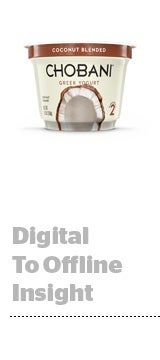 Greek-yogurt brand Chobani stays competitive with larger CPG companies by constantly testing.
Greek-yogurt brand Chobani stays competitive with larger CPG companies by constantly testing.
One of these tactics includes marketing-effectiveness studies, such as a recent research initiative with Yahoo and Nielsen Catalina Solutions (NCS) to prove search ads drove in-store sales.
“If you’re an ecommerce brand, you can measure that sale directly,” said Jessica Lauria, senior director of brand communications for Chobani. “You know that person saw an ad, they clicked on it and purchased. For CPG brands, someone has to go in a store to get us, so of course there’s a gap there.”
With its agency OMD, Chobani exposed a subset of consumers to search ads on Yahoo last spring and summer and measured the resulting sales effect using NCS data around demographics, regional purchases and purchase history.
Chobani found that consumers exposed to branded Chobani search ads spent 9% more than consumers who just made generic searches around yogurt or healthy eating habits.
Lauria spoke with AdExchanger about the campaign and Chobani’s strategy on merging media and marketing effectiveness.
AdExchanger: How did you pull off the Yahoo/NCS study?
JESSICA LAURIA: For CPG brands, so much activity happens offline, so it’s still really hard to measure.
When we’re looking at search terms, we are looking at people searching for Greek yogurt. It’s a mix of male and female – maybe slightly skewed female. When we’re talking about search terms, we’re not even talking about targeting. We’re just looking at behaviors. This study shows the importance of SEO and SEM. From a production standpoint, [SEM] is very low-hanging fruit that you can turn off or on more easily and efficiently than other channels, but [still drive] a meaningful result.
Had you done a campaign of this caliber before?
We’re trying to create more awareness. If we can motivate somebody to go purchase the product, that’s the real win. So we’re constantly looking for ways to prove this out. Yahoo was great, but we also work with Facebook and Datalogix on certain things. [These opportunities are] not constant, so when we prove results out that find advertising can impact sales, we can optimize what we invest in more effectively.
Chobani invests a lot in Google search as well. What was different about the Yahoo use case?
At the end of the day, you’re buying search terms, and these platforms are trying to show a different offering for brands. So it’s not about one search provider over another. It’s the ability to track and trace, which Yahoo is now showing they can do. One thing we found was interesting was we could see what the impact [of both branded and unbranded search terms] was on offline sales.
A lot of platforms, like YouTube and Datalogix, aim to prove media drives offline ROI. Are brands like Chobani interested?
It’s interesting. Social media a few years ago was this organic community and now it’s become an advertising platform. We see Pinterest trying to get into this now as well. Just like all advertising platforms, there needs to be ROI and proof that it’s working. They have to offer this in order to survive, especially as media plans come together. They require [proof points] for the C-suite, which requires much more than just a community effort. That’s still important, but we want to prove it’s an efficient buy and will work hard for us on the back end.
How have programmatic priorities shifted for brands like Chobani?
I’ve been in media and advertising for 15 years, and every few years, there’s a shift. Everyone goes all-in and then you see the model change once people see the [pros and cons] of a particular strategy. With programmatic buying, the past three years have been super hot. [There are] a lot of third-party vendors coming in directly to brands – we get calls always – and people saying, “We can help you do all this stuff.”
There will come a point where there’s another shift. Whether that be more brands bringing stuff in-house, which you see with content – more people doing things in-house creatively. At Chobani, we have a lot of former agency professionals in-house, which makes us stronger and more efficient. Even though we love all our agency partners, we challenge them in the right places.
The interview has been edited for clarity and length.














